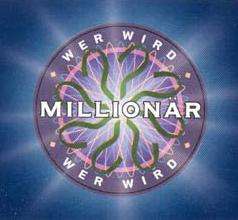Wer wird Millionär? (Swiss game show)
Wer wird Millionär? (English translation: Who becomes a millionaire?) was a Swiss game show based on the original British format of Who Wants to Be a Millionaire?.
| Wer wird Millionär? | |
|---|---|
 Wer wird Millionär logo | |
| Created by | Endemol |
| Presented by | René Rindlisbacher (2000-2001) Claudio Zuccolini (2011-) |
| Country of origin | Switzerland |
| Release | |
| Original network | TV3 |
| Original release | 27 March 2000 – 13 December 2011 |
| External links | |
| Website | |
The show was hosted by René Rindlisbacher. The main goal of the game was to win 1 million CHF by answering 15 multiple-choice questions correctly. There were three lifelines - fifty fifty, phone a friend and ask the audience. Wer wird Millionär? was broadcast from 27 March 2000 to 2001. It was shown on the Swiss TV station TV3. The biggest prize won on the show was 500,000 CHF won by Hans Frauchiger.
From 29 November - 13 December 2011, Swiss TV station 3+ resumed the Show with slight changes: the lifeline ask the audience was replaced by ask the experts and the candidate needs to choose at the beginning of the game whether he plays the save or the risky variant. If he chooses the risky variant, he gets a fourth lifeline, "Switch the question", but he loses the second guaranteed sum.
Money tree
| Payout structure | ||
|---|---|---|
| Question number | Question value | |
| 2000–2001 | 2011 | |
| 1 | 100 CHF | |
| 2 | 200 CHF | |
| 3 | 300 CHF | |
| 4 | 500 CHF | |
| 5 | 1,000 CHF | |
| 6 | 2,000 CHF | |
| 7 | 4,000 CHF | 3,000 CHF |
| 8 | 8,000 CHF | 5,000 CHF |
| 9 | 16,000 CHF | 8,000 CHF |
| 10 | 32,000 CHF | 15,000 CHF |
| 11 | 64,000 CHF | 25,000 CHF |
| 12 | 125,000 CHF | 50,000 CHF |
| 13 | 250,000 CHF | 150,000 CHF |
| 14 | 500,000 CHF | 300,000 CHF |
| 15 | 1,000,000 CHF | |